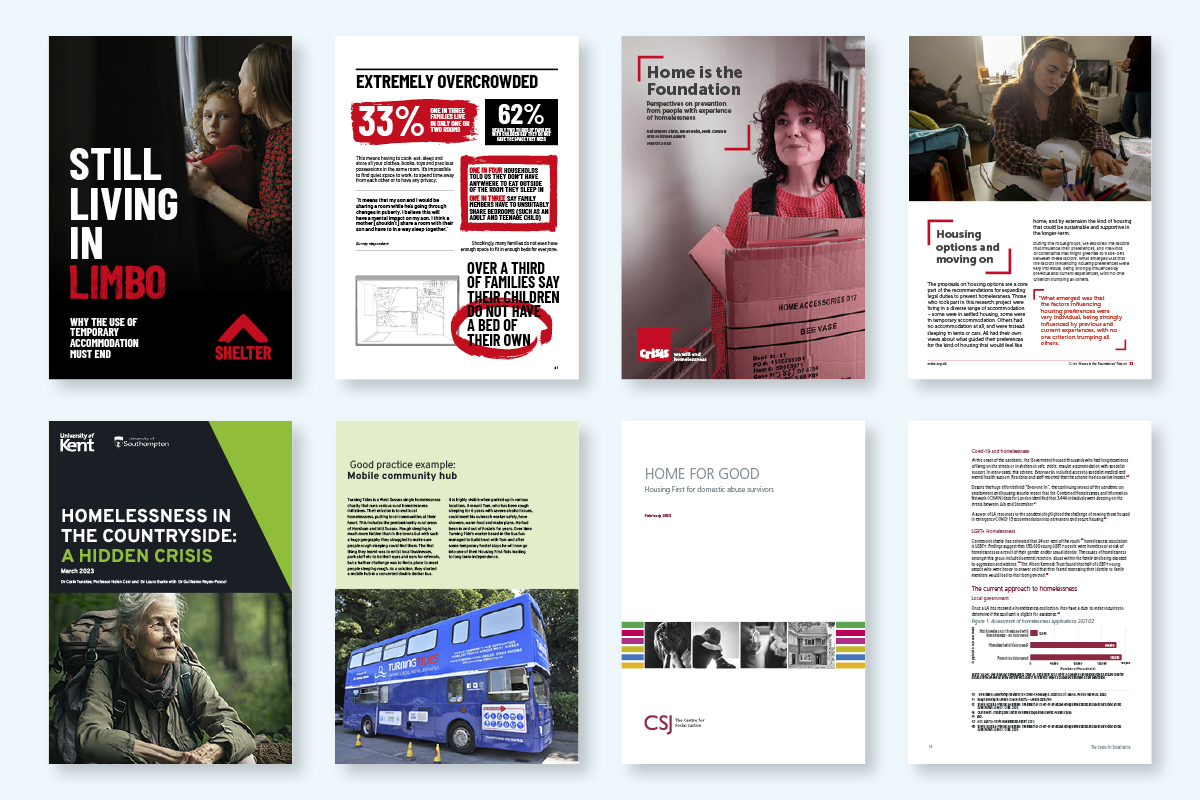You are viewing 1 of your 1 free articles

The Thinkhouse Review: it is time to step up on temporary accommodation and ending homelessness
There are four reports looking at the different challenges of homelessness and temporary housing. Professor Peter Williams runs through them in this month’s Thinkhouse Review
In looking at this month’s Thinkhouse contributions, there was the almost inevitable mix of reports – in this case covering building and planning, the Right to Buy, community land trusts and community businesses, housing for older people, as well as a cluster focused around homelessness and temporary accommodation.
In choosing to focus on this cluster, I was probably unduly influenced having listened to a presentation on homelessness across Great Britain by Faye Greaves, housing programme manager at Crisis, at the launch of the UK Housing Review 2023.
Faye was drawing upon a chapter on homelessness in the review by Lynne McMordie, research associate at the Institute for Social Policy, Housing and Equalities Research at Heriot-Watt University. Both her summary and the article provided a valuable synoptic overview of homelessness across Great Britain and the way it is evolving under the growing dual crisis of reduced public expenditure and the rising cost of living.
There are four reports that take different slices across the multi-dimensional challenges of homelessness: Centre for Social Justice (CSJ) on Housing First, Crisis on the situation in Scotland, Shelter on temporary accommodation, and the Universities of Kent and Southampton on homelessness in the countryside.
The CSJ report is focused on the impact of the Domestic Abuse Act 2021 and the number of households presenting and being accepted as homeless because of domestic abuse. It highlights the shrinking base of permanent accommodation and the rising use of temporary and often unsuitable homes and the key role now being played by Housing First schemes in England.
The report sets out a long list of recommendations about how to both expand and improve Housing First to better deal with people suffering from domestic abuse.
Crisis makes the point that despite Scotland having some of the best protections for people who lose their homes, the challenge of homelessness remains. Planned legislation for later this year has the potential to ensure households have earlier access to assistance, not least to give them more control over the process.
“[Ministers] are still fiddling while Rome burns and parking the problem for the next minister. Homeless people deserve solutions, not platitudes”
This report draws upon the views of homeless people. It highlights the multiple triggers that can result in the loss of a home, which in turn underlines the need for flexible and person-focused support.
Homelessness in the countryside is so easily overlooked, even though we might more readily recognise the vulnerabilities of rural economies and the pressure of housing in many of these areas.
The work by academics at the Universities of Kent and Southampton was commissioned by a number of housing organisations and is based on case studies and desk research. It is a powerful piece of work highlighting the need to build a much better understanding of the situation and argues why both Local Housing Allowance and service provision need a radical rethink.
Finally, we come to the Shelter report on temporary accommodation. The recent press commentary on Afghan refugees in hotels has highlighted some of the failings of the temporary housing ‘solution’ and the need for permanent homes.
Quite rightly, Shelter argues for a legal limit on how long a household can be placed in temporary accommodation and, of course, for a rapid and substantial expansion of suitable long-term homes.
“Our continuing failure to deal with homelessness properly is just adding to the spending burden and to the real costs borne by households and communities”
What these reports underline is the failure of supply and the lack of funding and action by central government. Local authorities are placed in impossible situations. Ministers and officials can point to new initiatives and more funding (but not in real terms). They are in essence still fiddling while Rome burns and parking the problem for the next minister. Homeless people deserve solutions, not platitudes.
We know that households are being placed under enormous strain by rising costs and falling real incomes. John Perry is policy advisor at the Chartered Institute of Housing, and his synoptic overview of housing expenditure plans in the latest UK Housing Review highlights the very variable performance of the four administrations.
Choices are being made as to how to spend public money, and real homes for all is ultimately a very cost-efficient solution. As it stands, our continuing failure to deal with homelessness properly is just adding to the spending burden and to the real costs borne by households and communities.
Professor Peter Williams, departmental fellow, University of Cambridge’s Department of Land Economy
Sign up for our homelessness bulletin
Already have an account? Click here to manage your newsletters












